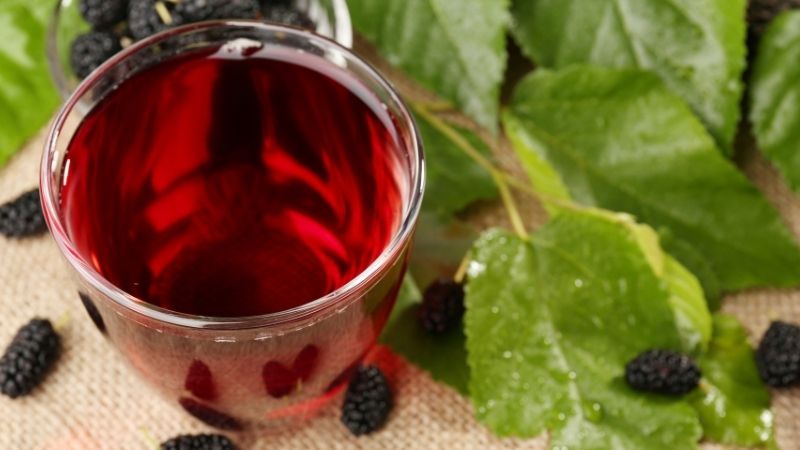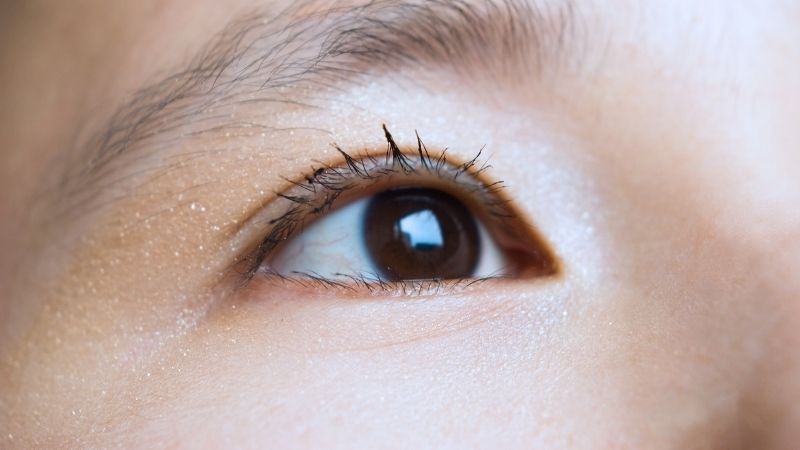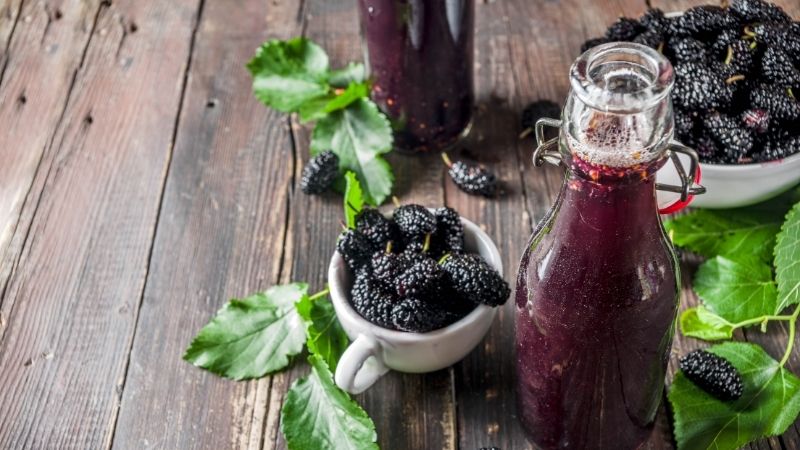Morus alba leaf juice, or water, has long been a popular drink among Vietnamese people due to its cooling properties, making it ideal for hot days. But beyond its ability to cool the body, this beverage also offers several health benefits. Let’s explore them!
1 What is Morus alba Leaf Water?
Among the fruits in Vietnam, Morus alba is one of the few that can utilize all parts of the plant, from its leaves to its fruits, as herbal remedies with various positive effects.
In terms of shape, Morus alba leaves grow alternately and have an oval, oblong, or heart-shaped appearance with a pointed tip. They are soft, measuring 5–10 cm in length and 4–8 cm in width. In traditional medicine, Morus alba leaves are used for silkworm feeding, cooking soup, and treating various ailments such as diuretic support, treating dry coughs, edema, and boosting immunity to prevent colds and flu.

Now, let’s focus on Morus alba leaf water. This beverage has a slightly bitter and sour taste but offers a cooling sensation, making it quite palatable. Morus alba leaf water is prepared by boiling the leaves with water and additional ingredients that enhance their efficacy, such as Job’s tears seeds, lotus leaves, or dried lotus seeds. Depending on the ailment being addressed, Morus alba leaves are combined with other ingredients to create specific remedies for optimal effectiveness, such as treating pink eye, insomnia, and skin beautification.
2 What Are the Benefits of Drinking Morus alba Leaf Water?
First, let’s discuss what makes this drink so special—the Morus alba leaf itself. This versatile herb is used in a variety of preparations, from direct consumption to wine infusion and medicine making.

Additionally, Morus alba leaves provide a rich source of nutrients, including amino acids such as alanine, sarcosine, lysine, leucine, isoleucine, and arginine, as well as organic acids like tannin and isobutyric acid.
It’s important to note that, according to Associate Professor MSc. Doctor Nguyen Thi Bay from Ho Chi Minh City University of Medicine and Pharmacy, it’s advisable to consult a physician before using Morus alba leaves to treat any medical condition to ensure their suitability and achieve the desired results.
Stabilizes Blood Pressure
Resveratrol, a crucial flavonoid, has a direct impact on specific mechanisms within human blood vessels, primarily by reducing their blockage caused by angiotensin, a substance that can induce blood vessel constriction.

In reality, resveratrol increases the production of nitric oxide, which is considered a vasodilator. As a result, it relaxes blood vessels, reducing the formation of blood clots and lowering the risk of cardiovascular issues such as stroke and heart attack. Resveratrol, present in Morus alba leaves, effectively balances and regulates blood pressure.
Treats Insomnia

Thanks to the pharmacological properties of nutrients like carotenes, tannins, vitamin C, choline, adenosine, pentosan, malic acid, and calcium carbonate found in Morus alba leaves, traditional medicine has long used these leaves to treat chronic insomnia as they help reduce stress and fatigue while promoting restful sleep.
Prevents Colds

Morus alba leaves have a bitter-sweet taste and a cold nature, offering wind-heat dispersion, lung hydration, and treatment for dry lungs. These leaves possess distinct cooling and moisturizing properties, making them effective in treating colds and flu.
Enhances Skin Beauty

The presence of α-hydroxy acid in Morus alba leaves is known to be an ideal skin-beautifying ingredient for women, effective in treating freckles and age spots. Additionally, Morus alba leaves aid in exfoliating dead skin cells and regenerating new skin, leading to skin rejuvenation.
Improves Eye Health

These leaves are excellent for relieving eye fatigue, disinfecting, and preventing eye infections. The presence of vitamin B1 in Morus alba leaves helps brighten the eyes, while vitamin C enhances vision.
3 Precautions When Using Morus alba Leaf Water
Although Morus alba leaves don’t typically cause severe side effects, excessive or improper consumption may lead to some negative consequences:
Reduced Starch Absorption: Excessive consumption of Morus alba leaves can significantly impair the body’s ability to absorb starch. This is one of the adverse effects of overindulging in Morus alba leaves.
Increased Risk of Blood Sugar Disorders: According to a US report, when 50 individuals consumed Morus alba-related products, their blood sugar levels significantly decreased after the experiment.
Skin Cancer Risk: While hydroquinone in Morus alba leaves has proven effective for skin beautification, excessive use can lead to epidermal cancer.
Impaired Kidney Function: The saponin content in Morus alba leaves can adversely affect the bladder and kidneys. Therefore, patients with kidney-related issues should exercise caution when consuming Morus alba-based products.

Thus, doctors advise against consuming Morus alba leaf water for those with physical exhaustion, mild colds, mild diarrhea, abdominal pain, and breastfeeding women.
While Morus alba leaf water offers numerous health benefits, it’s essential to consider your health condition and consult a healthcare professional before incorporating it into your routine. Wishing you good health!
Unlock 8 Benefits with a Daily 5-Minute Jog
Living a hectic lifestyle can make fitting in time to exercise difficult. However, studies have revealed that even just 5 minutes of jogging a day can lead to positive outcomes for your health, including a decrease in the risk of developing cardiovascular disease, extending your life span by up to 3 years, or even reducing the susceptibility to heart disease.





































